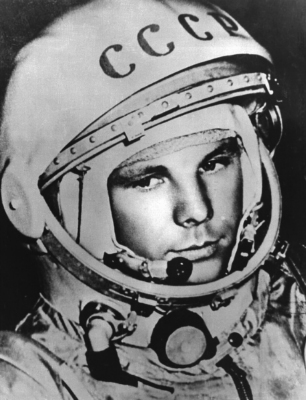
By Ashley R. Pollard
A is for atomic and apocalypse, and this month also for Andromeda. Of the three, the most entertaining is the new TV series on the BBC, called A for Andromeda, written by Frederick Hoyle and John Elliot. Hoyle is an astronomer and noted cosmologist who also wrote the science fiction novel The Black Cloud, while Elliot is novelist, screenwriter and television producer.

Andromeda gripped me from the very first episode, called The Message, the opening sequence being an interview with Professor Reinhart, explaining the project as something that had happened in the past. The story cuts to the professor and his research assistants, Jason Fleming and Dennis Bridger, working at the new radio telescope at Bouldershaw Fell…in 1970. If that’s not a hook that grabs your attention then I don’t know what is. The episode title gives the gist of the plot — alien message — and the series title tells you where the aliens are from — Andromeda.
The second episode, The Machine, builds on the message and we discover it is the plans to build a better computer, which the British government decide to do at a military base in Thorness, Scotland. Here the plot starts to twist and turn with Dennis Bridger selling the information to a slightly sinister corporate conglomerate called Intel (a clever name; someone should put it to good use).

The third episode, The Miracle, moves the story into Hoyle's special area of interest: life from space. You may have heard of his famous stellar nucleosynthesis paper of 1954 — Frederick Hoyle is one of the foremost scientists of his generation and a populariser of the philosopher Anaxagoras theory of panspermia, a controversial theory. The story introduces Madeline Dawnay, a biologist, who joins the team to help with the creation of a synthetic life-form that the computer instructions have given them. Dennis Bridger’s betrayal is discovered, and he gets his just desserts while fleeing justice…when he falls off a cliff.
In last week’s episode, The Monster, the story has moved forward to 1971, where we bear witness to the creation of a protoplasmic life form named "the cyclops." Fleming, our hero of the series, is skeptical of the machine’s agenda and worried that it can affect the minds of those who come into close proximity to the machine. We are left wanting more, and next week’s episode title, The Murderer, certainly leaves us something exciting to look forward to!

However, this time, reality has the jump on fiction, excitement-wise. It comes in the shape of what the press is calling the Tsar Bomba or Kuz’kina Mat’ — Russian for "Kuzma’s mother" — a reference to Premier Nikita Khrushchev’s promise to show the United States the true might of Soviet power during the United Nations General Assembly earlier this month.
Or more simply, the mother of all bombs.
The Russians turned their premier’s statement into a demonstration of their nuclear might at 11.32 Moscow time on October the 30th by detonating a 50 megaton bomb over the Mityushika Bay the Soviet nuclear testing range. For those of you whose geography is a little hazy, this is just north of the Arctic Circle over the Novayo Zemlya archipelago. The shock wave from the blast is reputed to have circled the Earth four times. Reports of seeing the explosion came from a nearly thousand kilometres away from the blast site.
The size of the explosion is almost beyond comprehension. The only way I can get my head around it is knowing that it’s the equivalent to ten percent of all the nuclear bombs detonated to date or ten times the combined energy from all the bombs dropped during the second world war. Such numbers are frightening and make the threat from aliens trying to take over the Earth pale into insignificance by comparison.
Perhaps it is because the threat to all life on Earth becoming extinct is an existential one, now that we live in the atomic age, that we enjoy such outrageous fare as Andromeda. When we consider such matters, our minds are overwhelmed by prime emotions, which reduce our reasoning to that of the hominids we’re descended from. I would argue that science fiction allows us to discuss that which is too frightening to comprehend.
So whether A is for atomic, apocalypse or Andromeda is really not the question. Rather, our need to tell stories to understand ourselves is the way we face the end of life.













































